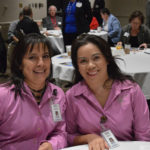Pope Francis’ 57th World Day of Social Communications message, published in January, serves as an antidote — and a solution — to the vicious name-calling underway in the public square and in our media outlets. Read each paragraph, reflect on and absorb its content to build up muscles of compassion, a heart that listens with patience and a voice that invites dialogue – not monologue (https://tinyurl.com/5cj7vw4t).
While the Holy Father’s message addressed those in the field of communications, he pointed out “the commitment to communicating ‘with open hearts and arms’ … is everyone’s responsibility.” He cites Scripture passages in which we are “urged to keep our tongue from evil (cf. Ps 34:13), because as Scripture teaches us, with the same tongue we can bless the Lord and curse men and women who were made in the likeness of God (cf. Jas 3:9). No evil word should come from our mouths, but rather ‘only such as is good for edifying, as fits the occasion, that it may impart grace to those who hear’ (Eph 4:29).”
How many of us are willing to set aside our egos to impart grace on another person? How many of us long to be the beneficiary of another person’s grace? How do we free ourselves from the enticing diatribes on our favorite social media platforms that feed our sense of righteousness?
“Sometimes friendly conversations can open a breach even in the most hardened of hearts,” Pope Francis says in his message. The exercise of kindness becomes a “genuine antidote to cruelty, which unfortunately can poison hearts and make relationships toxic.” The media, and we as its consumers, need to choose decency over dollars to avoid fomenting “acrimony that exasperates, creates rage and leads to clashes.” We need to support and encourage media to practice communication that “helps people reflect and interpret with a critical yet always respectful spirit, the reality in which they live.”
Last month, U.S. Surgeon General Dr. Vivek H. Murthy issued an advisory on “Our Epidemic of Loneliness and Isolation,” which spoke of the fraying of the social fabric. Some 50 years ago, 45% of Americans felt they could reliably trust other Americans. In 2016, that proportion shrank to roughly 30%, the advisory states. Hurtful name-calling and “gaslighting” (causing people to question their sanity and powers of reasoning) feed that mistrust and animosity.
“One consequence of the natural tendency for people to build and maintain relationships with those who are like themselves is the risk for exacerbating polarization in our discourse and in society,” the advisory states, “potentially leading to poorer outcomes for broader society.” Conversely, building a culture of connection — based on the values of kindness, respect and service and commitment to one another — is one of six pillars the advisory recommends to advance social connection. This recommendation echoes Pope Francis’ message on how we ought to communicate with one another.
On June 17, our Diocese of Davenport will hold its Synodal Summit, leading us in a yearlong effort to building a more welcoming Church in which people feel a greater sense of belonging. The summit will equip parish and school leaders with the tools to foster that effort. The art of listening is among our essential tools, as Cardinal Joseph Tobin eloquently pointed out this past March during a conference on Pope Francis at St. Ambrose University in Davenport. The cardinal said, “If we want a synodal Church, we need to ask ourselves if we believe that the Spirit manifests freely through all persons and their life stories, even in points of view completely different and diverse from our own positions. The latter is also a mediation of the Spirit that we often forget because it can be uncomfortable to listen, talk and discern in common…”
Easier said than done, but we have the Gospels to guide us. Let us reflect on this paragraph, one of the final passages in Pope Francis’ message to communicators:
“As Christians, we know that the destiny of peace is decided by conversion of hearts, since the virus of war comes from within the human heart. From the heart come the right words to dispel the shadows of a closed and divided world and to build a civilization which is better than the one we have received.”
Barb Arland-Fye, Editor
arland-fye@davenportdiocese.org












